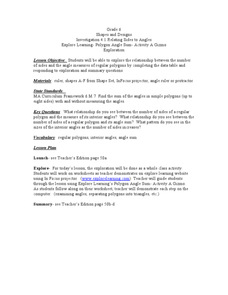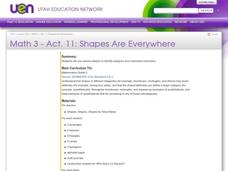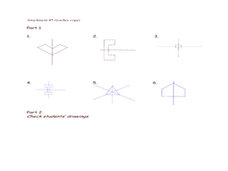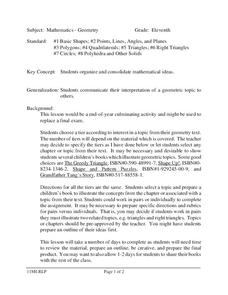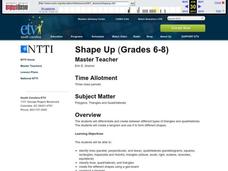Curated OER
Shapes and Designs
In this shapes and designs worksheet, 10th graders solve and complete 6 different types of problems. First, they fill in the first two columns of the table show with their shapes. Then, students measure the interior angles of each...
Curated OER
Similarity
Students find the factor of proportionality in similar polygons. In this similarity of polygons lesson plan, students measure the sides and angles of polygons and derive a factor of proportionality between corresponding pairs of sides...
Curated OER
Edible Geometry
Students examine a chart that lists the main characteristics of polygons and 3 dimensional figures. They make examples of the polygons and figures using pretzels and gum drops showing how the gum drops are vertices and the pretzels are...
Curated OER
Sum of Interior Angles
In this sum of interior angles worksheet, 10th graders solve 10 different problems that are related to determining the sum of various interior angles in figures. First, they determine the sum of the interior angles of a dodecagon. Then,...
Curated OER
Exploring Tessellations
Fifth graders examine how to make tessellations. For this tessellation lesson, 5th graders review the meaning of the word "polygon" while the teacher shows them various examples. They practice making tiling patterns or tessellation's...
Curated OER
Shapes Are Everywhere
Third graders use various shapes to identify polygons and understand symmetry. They explore pattern blocks noticing their similarities and differences, then share with other team members. They draw 3 polygons in their journals and...
Curated OER
Using R&R to Teach Mathematics
Second graders create a shape garden. In this polygons lesson, 2nd graders practice making shapes using a geoboard and read the book The Greedy Triangle by Marilyn Burns. Students also design a shape garden using construction paper.
Pennsylvania Department of Education
A Geometric Scavenger Hunt
Fifth graders connect their knowledge of polygons and polyhedrons. For this geometric shapes lesson, 5th graders identify and classify two- and three-dimensional objects. Students construct a polyhedron out of polygons and describe their...
Curated OER
Similar Polygons
In this similar polygons worksheet, students identify the corresponding sides of polygons. They use proportions to solve problems. Students determine the scale factor of similar figures. This two-page worksheet contains diagrams and...
Curated OER
Tessellmaniacs
Seventh graders create 3 original tessellation using polygons. They slide, turn, rotate and glide their designs on the computer. They print their tessellation on a T-shirt and teach the 6th graders about tessellations.
Curated OER
Geometry: Calculating Perimeters
In this perimeter worksheet, students find the perimeter of 3 polygons. Students find the perimeter of irregular polygons given various side lengths.
Curated OER
Obtuse Angles
Third graders recognize and identify geometric shapes, work with manipulatives to reinforce understanding, and create polygons with various angles to display their knowledge of the different types of angles.
Curated OER
Angle Bisectors
In this angle bisector worksheet, 10th graders solve and complete 23 various types of geometry problems. First, they find the angles listed in the figure shown. Then, students determine the sum of the interior angles of a polygon. They...
Curated OER
Similar Polygons
In this similar polygons worksheet, 10th graders solve and complete 20 various types of problems. First, they solve each proportion. Then, students write a ratio expressing the slope of a line through each pair of points. In addition,...
Math Mammoth
Finding the Area of Rectangles, Parallelograms, and Triangles
In this area of polygons activity, 9th graders solve two area of rectangles, one area of parallelogram, and ten area of triangles problems. The formulas for finding the area of these figures are provided.
Curated OER
Symmetry and Tangrams
Sixth graders build figures out of tangrams. In this symmetry lesson, 6th graders view tangrams and identify the polygons included in them. Students divide into groups, identify their tangram pieces, define the lines of symmetry, and use...
Curated OER
Napolean Triangle
Students investigate the Napoleon triangle theory. In this polygon lesson, students differentiate between the boundary points, interior and lattice point of a polygon. They apply concepts of equilateral triangles to solve problems.
Curated OER
Exploring Area and Perimeter
Two young scholars are blindfolded and each receives a cardboard square, one with pompoms glued around the edge and one with pompoms glued all over the surface. They identify what they feel. The class discusses perimeter and area of...
Curated OER
Grade 3: What Can I Make with 30 Centimeters?
Third graders create polygons with perimeters of 30 centimeters, use the centimeter grid paper to determine the area of each shape, and organize the shapes to make generalizations from the patterns they see.
Curated OER
Properties of Quadrilaterals
In this properties of quadrilaterals worksheet, students use the properties of quadrilaterals to find the perimeter, angle measurement or length of a missing side of a given polygon. Examples and explanations of the properties are...
Curated OER
Basic Shapes
Students create books about shapes. In this shape lesson, students select a topic such as points, lines, angles, planes, polygons, quadrilaterals, triangles, circles, and polyhedra. In groups, they create an illustrated children's book...
Curated OER
Shape Up
Students explore differents types of triangles and quadriaterals. In this polygon lesson, students model identify and compare two and three dimensional geometric figures. Students create tangrams and discover the difference between...
Curated OER
Shape Tool
Students explore various polygons and examine how shapes can be manipulated in a variety of ways. In this shape tool lesson, students identify geometric shapes in two dimensions. Students identify and draw one line of symmetry in a...
Curated OER
Polygons
In this polygons worksheet, 10th graders identify and name 16 different figures that are related to various types of polygons. First, they label each of the figures shown with polygon or not a polygon. Then, students write the reasons...
Other popular searches
- Irregular Polygons
- Classifying Polygons
- Congruent Polygons
- Four Sided Polygons
- Sorting Polygons
- Photos of Polygons
- Area of Polygons
- Compute Areas of Polygons
- Identifying Polygons
- Perimeter of Polygons
- Convex and Concave Polygons
- 2d Polygons


